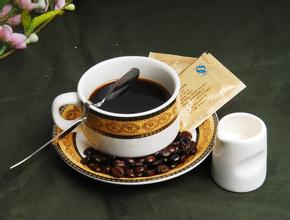About coffee knowledge introduction === How does the thickness of coffee powder affect the taste
Introduction to coffee how does the thickness of coffee powder affect the taste
French filter kettle (rough grinding), electric drip pot (medium), hand punch, siphon pot, desktop smart filter cup (medium), mocha pot (medium), espresso (fine), Turkish coffee (very fine).
According to the European Fine Coffee Association (SCAE-Speciality Coffee Association of Europe), the rough grinding of the French filter pot indicates that each bean is crushed into 100,300 particles, each about 0.7mm in diameter. In the medium rough grinding of the electric filter pot, each bean is ground into 500 grains of 800 particles, with a diameter of about 0.5 mm. Moderately ground by hand and siphon, each bean is ground into 1000 to 3000 particles with a diameter of about 0.35. The fine grinding of espresso in which each bean is ground into 3500 particles with a diameter of about 0.05mm. Turkish coffee is ground into a flour-like ultra-fine powder, and each bean is ground into 15000mm 35000 particles.
According to the statistics of the grinding fineness of coffee beans in various places, it is found that the grinding of coffee in Taiwan must reach 70% to 75% of the coffee powder through the Mei Gui No. 20 standard sieve (sieve pore diameter 0.84 mm), but the corresponding domestic standards are not available for the time being.
The grinding degree of coffee powder is not good or bad, mainly with different brewing methods and different grinding degrees.
Roughness grinding is suitable for brewing of pressure pot.
Moderate grinding is suitable for hand brewing.
Fineness grinding is suitable for siphon pot cooking.
Very fine grinding is suitable for mocha pots and espresso machines
In addition, the grinding thickness of coffee beans will also affect the taste, under the premise of consistent objective conditions, generally speaking, the finer the grinding, the bitterness of the coffee will be more obvious, and it will also cover up other rich flavors of the coffee. The thicker the grinding, the heavier the sour taste, the more sour will make the coffee difficult to taste, so when you want to show a unique flavor of coffee, you can also achieve the effect through micro-survey grinding. However, this adjustment should be a moderate fine-tuning on the basis of the corresponding grinding degree of the apparatus, no matter what kind of vessel is used to extract coffee, generally speaking, the shorter the extraction time, the finer the powder needs to be ground, and the longer the extraction time is, the thicker the powder is. There are also special cases, such as Turkish coffee is ground very fine, but the extraction time is also very long. But except for those special utensils, other utensils are generally different utensils that follow this rule, and even different coffee beans in the same vessel need to be ground to a specific thickness. For all kinds of coffee extraction methods, whether the grinding degree is appropriate or not can directly determine its success or failure. The grinding of coffee beans seems complicated, but in fact, there are rules to follow.

Important Notice :
前街咖啡 FrontStreet Coffee has moved to new addredd:
FrontStreet Coffee Address: 315,Donghua East Road,GuangZhou
Tel:020 38364473
- Prev

Coffee growing place in C ô te d'Ivoire-- Environmental Weather requirements for Coffee cultivation
Ivory Coast Coffee growing area-Coffee planting conditions Weather requires that the development of Ivorian cocoa and coffee industry is basically divided into three stages: the first stage, 1960-1990, is the stage of government monopoly, the government through the national support for agricultural production price stabilization fund CSSPPA (CAISSE DE STABILISATION ET DE SOUTIEN DE PRIX DE PRODUCTION AGRIC)
- Next

Semi-automatic coffee machine use skills video tutorial introduction
Automatic coffee machine is the application of electronic technology to the coffee machine, to achieve the grinding, pressing powder, powder, brewing, removing residue and other automatic control of the whole process of brewing coffee. High-quality automatic coffee machine according to the set program to brew coffee, and are equipped with a perfect protection system, easy to use and reliable, just press the button to get high-quality
Related
- What brand of black coffee is the most authentic and delicious? what are the characteristics of the flavor of the authentic Rose Summer Black Coffee?
- Introduction to the principle and characteristics of the correct use of mocha pot A detailed course of mocha pot brewing coffee is described in five steps.
- Which is better, decaf or regular coffee? how is decaf made?
- How much is a bag of four cat coffee?
- How about four Cat Coffee or Nestle Coffee? why is it a cheap scam?
- Which is better, Yunnan four Cats Coffee or Nestle Coffee? How about cat coffee? is it a fake scam? why is it so cheap?
- How about Cat Coffee? what grade is a hoax? which instant coffee tastes better, four Cat Coffee, Nestle Coffee or G7 coffee?
- Process flow chart of coffee making-Starbucks coffee making process what coffee tastes good at Starbucks
- The top ten best coffee beans in the world Rose summer coffee or Tanzanian coffee tastes good
- Yunnan four cat coffee is good to drink?_four cat coffee is a big brand? four cat blue mountain coffee is fake?

